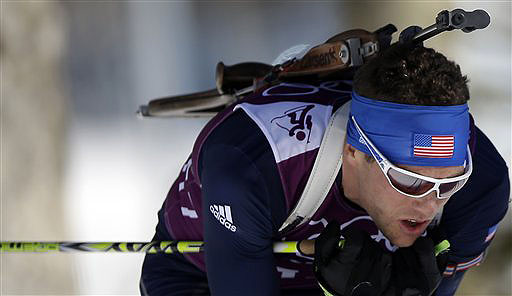KRASNAYA POLYANA, Russia — In an Olympics already beset by terrorist threats and security concerns, Tim Burke showed up armed and ready. Burke’s personal condition has been less than ideal in recent weeks, but he can report that his German-made 22-caliber Anschutz rifle arrived safe and sound.
There’s always that brief moment at baggage claim where Burke isn’t quite sure. As a biathlete, Burke totes his gun around the world for competition, not protection, but he’s still had the weapon confiscated at times, caught up in red tape other times or even lost in transit completely.
“We’re all set. Everything has been very smooth,” said Burke, one of five members of the U.S. biathlon team who trains at the Maine Winter Sports Center.
Truth is, the gun has been the least of Burke’s worries in the weeks leading up to his third Olympic Games. The United States has never won an Olympic medal in the biathlon, and Burke once again represents the Americans’ best hope. But sickness has hampered his recent training and forced Burke to withdraw from the last two World Cup events. Thursday marked his first serious training session in more than two weeks.
He’s expected to compete in six events at these Winter Games, and Saturday’s 10-kilometer sprint might be his best shot at a medal. Maine’s only Olympian, Russell Currier of Stockholm, is also scheduled to compete in the sprint.
• Course workers added 40 meters Friday to the biathlon track because it was too short.
The loop should measure 2.5 kilometers. Even though a 5 percent deviation is allowed by the rules, the track came up short.
“We had an issue with the length but we made a change, which takes care of it,” said Max Cobb, biathlon’s technical delegate at the Olympics.
First doubts about the track length came from the Norwegian team, and they proved right after biathlon officials measured the course Thursday.
MEN’S HOCKEY: Minnesota Wild center Mikko Koivu decided his surgically repaired right ankle has not healed enough to allow him to play for Finland in the Olympics.
Koivu had surgery after fracturing his right ankle while blocking a shot on Jan. 4 and has Minnesota’s last 15 games.
Koivu, a two-time Olympian, was the likely captain for Finland, which won the bronze medal in the 2010 Games in Vancouver.
Another Finnish player, Valtteri Filppula, also will miss the Olympics after the Tampa Bay Lightning center was hurt Thursday against the Toronto Maple Leafs. Filppula has a non-displaced right ankle fracture and will be out for three weeks.
• Sweden added Washington Capitals forward Marcus Johansson as a replacement for Henrik Sedin, who won’t play because of bruised ribs.
ALPINE SKIING: Even if he’s never finished better than fifth in a World Cup downhill, Austria’s Matthias Mayer is catching everyone’s attention ahead of the opening Alpine race at the Sochi Olympics.
That’s what happens when a guy turns in top-three times in the first two training runs, including the fastest time Friday.
Aksel Lund Svindal of Norway summed up what Mayer’s done: “Impressive skiing, two days in a row.”
Mayer was timed in 2 minutes, 6.51 seconds on Friday, 0.27 ahead of past overall World Cup winner Carlo Janka of Switzerland, and 0.55 ahead of Svindal.
The women’s training session was completed without a hitch, a day after the run was halted for an hour so a dangerous jump could be trimmed down. Fabienne Suter of Switzerland finished in 1:42.70, followed by Tina Weirather of Liechtenstein and Anna Fenninger of Austria. Reigning overall World Cup champion Tina Maze of Slovenia was fifth, one spot ahead of Stacey Cook of the U.S., with three-time Olympic medalist Julia Mancuso of the U.S. in 10th.
Send questions/comments to the editors.


